It isn’t uncommon for non-French parents who visit France to remark about French parenting when they see how well-behaved French children are compared to their own. Observers are often intrigued at:
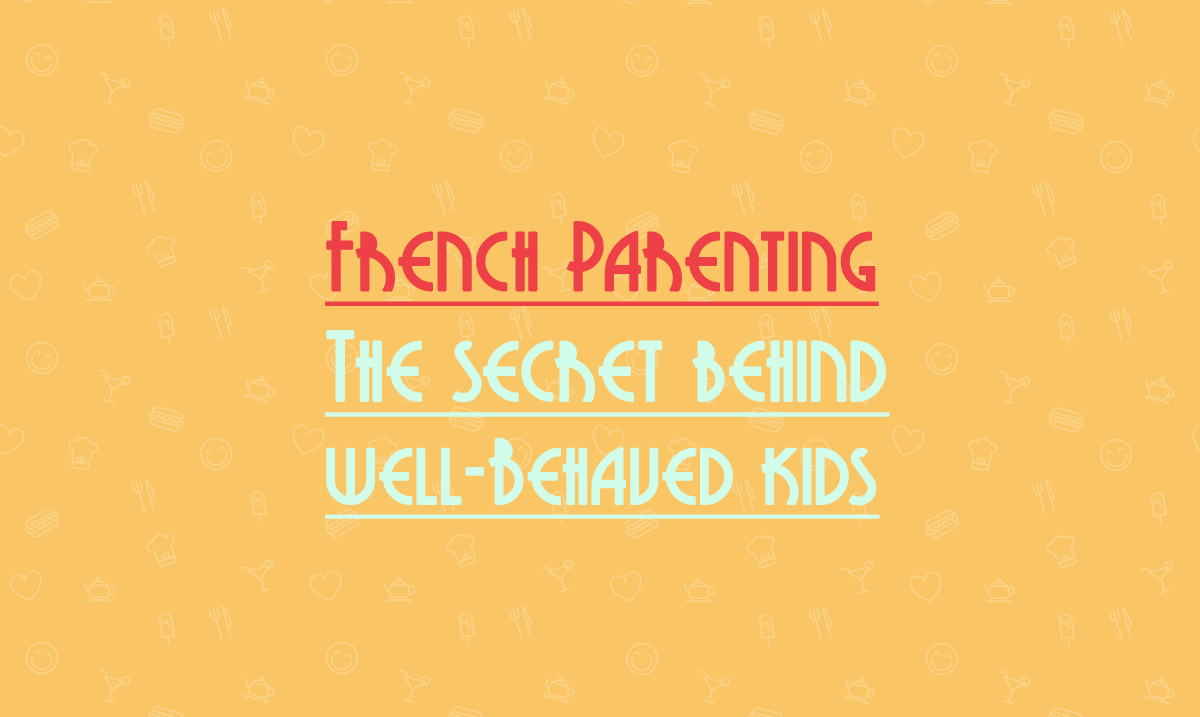
These observations have become all too prevalent that the interest in French parenting techniques has steadily increased in recent years. It has spawned several books written mostly by expats living in France. The books identified the techniques employed by French parents on their kids.
Let's take a look at some of these strategies below. Ssee if you can use it in your own parenting style, too!
1. The Two-Minute Pause
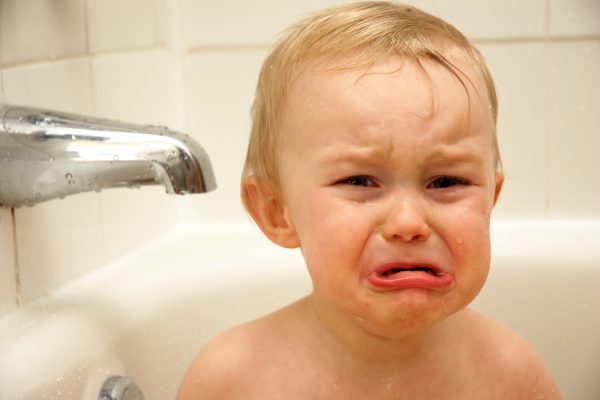
In her book, “Bringing Up Bébé: One American Mother Discovers the Wisdom of French Parenting” Pamela Druckerman, an American journalist living in Paris, mentioned that most babies in France sleep through the night as early as two months old.
While there are those who may find this observation doubtful, pediatric experts attribute this phenomenon to a parenting habit of the French that is sometimes referred to as the “two-minute pause.”
In this method, when infants suddenly wake up crying or makes a noise at night, the parents give the baby approximately two minutes to see if the baby can resolve whatever it is that bothered him or her. Only if the baby appears to be unable to soothe itself back to sleep in those couple of minutes will the parents attend to it.
While this may seem a bit unorthodox and goes against the normal parenting instincts, pediatric experts explain that babies have two-hour sleep cycles and the two-minute pause teaches them to link these sleep cycles together.
If a parent immediately sees to the baby whenever the baby cries at night in between these cycles, the harder it will be for the baby to learn how to connect the cycles together. What may even make things worse is that the baby will now become dependent on an adult to soothe him or her back to sleep.
2. Table Manners
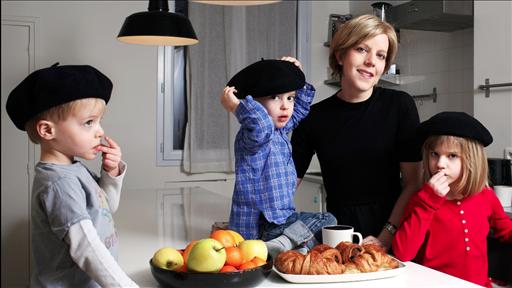
Source: demeterclarc.com
One of the most commonly admired habits of French children is that they seem to have no problem eating ‘adult’ food.
While a good number of non-French parents usually assume that kids prefer hotdogs, burgers, chicken nuggets, or fries over regular meal fares, French children on the other hand are introduced to an assortment of food at a very young age. To French parents, there is no such thing as kiddie food or adult food, but just food.
In one section of her book, Druckerman commented on how she realized how different her child was to French children while dining in a restaurant. She noted how behaved the other children were on their high chairs enjoying their food, while her child was giving her all sorts of problems, being all picky and making so much fuss.
The writer also learned that family meal times were also strictly observed in French household. She surmised that early exposure to a variety of food and strict observance to meal times ingrain table discipline into French children. This results to good table manners being second nature to them.
3. Patience Training
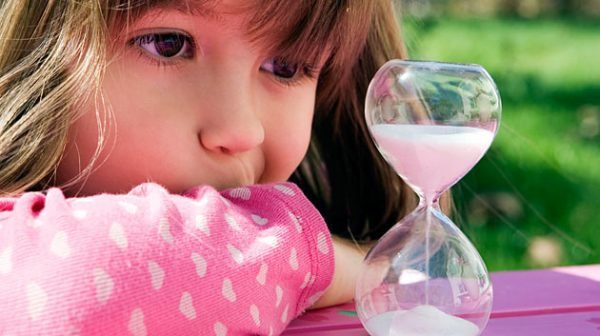
Source: Parentable.com
This facet of French parenting is somehow connected to the two previous topics that were already mentioned. One commonly admired behavior of French kids is that one rarely sees any of them throwing tantrums in public.
Apart from instilling discipline into their children, French parents also teach their kids the virtue of patience. Kids will often try to find ways to get their parents to give in to their demands. One of the surefire ways to get parents to say “yes” would be to wear them down with persistent nagging and whining.
Child psychologists are one in saying that parents should not be rewarding kids for bad behavior. It not only encourages them to do it again, but it likewise gives them a semblance of authority.
When French parents tell their kids “no” or “wait,” they both believe and mean it. Unlike other parenting styles that give way to negotiating with your children, the French will not even entertain the idea most of the time. This trains French kids to have patience at a young age.
It is believed that this type of patience training will sometimes help kids become more composed as they grow older.
4. La Fessée
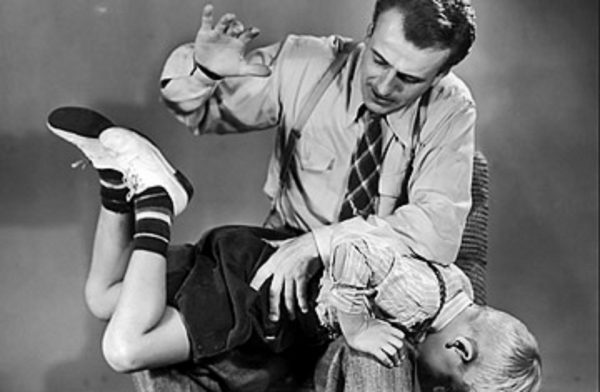
Source: thefamilypodcastnetwork.com
French parents are often viewed, especially by other parents from neighboring countries, as being too rigid and authoritative with their children. This may be true to a certain extent as French parents still prefer la fessée, or spanking, over the trendier parenting styles that encourage “soft behavioral moulding.” This of course is just some fancy way of saying that parents should cut their kids some more slack.
French parents however, will teach their children the meaning of authority as early as possible and expect them to abide by the rules set by them.
As authoritative and rigid as French parents may seem, they do not employ la fessée right off the bat. A stern 'arrête!', or stop, will serve as a warning for misbehaving children, followed by "ça suffit!" or ‘that’s enough!’ for good measure.
The spanking part will be necessary during the early part of the kid’s training. As the kids learn these stages however, the "ça suffit!" part will often be enough to get them to behave.
5. Dissenting Opinions
As can be expected, there will be those who will not totally agree with the French style of parenting. One British lifestyle writer opined that French parents do not regard their children as their equals, but are just small human beings all set to be formatted and molded by the state education system.
This same writer added that this pattern of behavior exhibited by French kids are mostly due to their education system wherein they are left for as long as 12 hours in a local crèche run by the state, where they have no other choice but to become independent and sociable.
Some of writer Druckerman’s fellow American parents for their part accuse her of being just too enamored by the French culture that her views on parenting are somehow tilted in their favor. It should be noted though that Druckerman’s book “Bringing Up Bebe…,” is not a how-to guide for parents using French parenting styles. It is merely the writer’s observations on how children are being raised in France.
Despite this however, some non-French parents obviously feel slighted by Druckerman’s observations and musings as an American parent expat.
Also note her observations are mostly made from a Parisian perspective and you will find some (or a lot) differences between French people depending on their social background, education, and so on...
It will of course be naïve to think that the French style of parenting will apply in any setting or location. Our cultures, sense of community, religion, and social norms have always been the most influential variables in the varying styles of parenting. There is one article comparing French and American parenting, you can check it out here.
Conclusion
What works for French parents, will not necessarily work for others and vice versa. Parents however, are bound by a moral commitment to play their roles in the best way possible. Examining what works for other cultures, like the French for instance, is one way for parents to become the best that they can be for their kids.
I understand that this is a tricky subject. I would appreciate it if you could share your thoughts in the comments section.
Do you think you could use French parenting methods with your own children?
For more related content, see the following:
10 Unusual French Habits You Should Know About Before Visiting France
The Complete Guide to Teach Kids French at Home
10 Things to Do With Your Kids in Paris
Learn French with your child with the help of French bedtime stories! Check it out below.


[…] Discover the secret behind well-behaved kids in France. […]
That’s an amazing article. I really think that some cultures are being demolished by that mentality of letting the children do whatever they want. Is like anarchy inside of a family. And as those kids grow up they lose all sense of good authority or measure of authority or respect for the older. Plus, at some point someone may become the authoritative model for those grown ups and without a solid education (family driven) is seems easier for those kids to accept some harmful ideas as good.
I’m only 23 and think like this since I don’t know when. Even as I kid I took an absurd that parents should allow they kids to shout, cry, make a scene and grab the wheels of the family by its own desires.
A Great article.
Have a great week
Hello Nata, it is always a debate about how to raise kids. I tend to lean toward your side. I share an article from parentable and they show which country do a better job at educate some aspects. French education has also its own flaw (quite a lot actually). 🙂
Great article and I can’t wait to read more about French Parenting. I have a 4 year old nephew (French dad, Colombian mom) and his French background has influenced so greatly in his upbringing that it is clearly a cultural approach. He understand even at such an early age authority at all levels, is well mannered and perfectly spoken, eating habits and preferences are amazing and even extracurricular activities are for one to be amazed. French parents seem to be very educational to me and that is a great advantage. Many cultures leave education to the school and parents are to busy working and carrying on with their social lives that they forget the importance of their roles and how much can discipline do for the rest of their lives. It should be a general approach but sadly, is not.
An anecdote: I asked my sister what I should have my nephew at least for the first day of his visit in the US while we would go grocery shopping, she said: pitless green olives, yogurt, crab meat, apple juice, bananas, croissants, milk and cheese. No junk food, all healthy.
Thank you for the anecdote. In France we tend to have a better balance between work and family life which can help us to spend more time with our family. In some countries it does not seem to be the case.
[…] French Parenting: The secret behind well-behaved children. […]
[…] French Parenting: The Secret Behind Well-Behaved Kids in France […]
This is a great article and explains a great deal about French parenting methods. It’s interesting that they start exposing babies to various adult foods at a such a young age. One question: are the schools in France more strict compared to American schools?
I guess it is but it depends the teacher and the school as well.
I am American born however my grandfather was Canadien so the French Canadien and French culture naturally have my interest. I know French and have taken classes as well as learned a bit of the culture and agree with the parenting style. The only comment I have is about how the French way of parenting wouldn’t apply to every situation or region. I disagree, especially being from America, I feel that society has the most influence on what is appropriate parenting and what is the right way, or sensible way, isn’t as easily attainable as the soft “authoritative” we’re known for now. I’m actually ashamed and being a new father with a 4 mo I am hoping to change that pattern for the better with the methods of an obviously more respected country in the realms of child rearing.
My 3 children (half French half Filipino) and I lived in New Caledonia many years ago for 14 months. I sent them to the local school where many expat kids go. The difference between the French and Australian school systems are very noticeable. The French are tough. I have never seen my children – years/grade 5, 2, and maternelle – work so hard without me saying a single word. They study until about 9:00 pm – every night , no tv, no playing, no silly breaks. They learned to write beautifully, and keep their notebooks in colour coded handwriting, they used pens, pencils, fountain pens, markers, highlighters! Their physical education was unbelievable – my 9 year old daughter learned to assemble and sail her boat with a 6-year old partner and sailed in impending storm, returned and disassembled their boat and put back in the storehouse. The kids there had respect for authority, a stranger can tell them off and they will obey, no answering back. Neighbors can discipline a child in wrongdoing and the parents won’t mind.
The only thing I would change is to lighten up a bit in school as the kids grow up stressed somehow. The teachers are generally stressed too. If they modify this – it will be all round an truly admirable system.